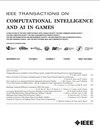A Survey on Story Generation Techniques for Authoring Computational Narratives
Q2 Computer Science
IEEE Transactions on Computational Intelligence and AI in Games
Pub Date : 2017-09-01
DOI:10.1109/TCIAIG.2016.2546063
引用次数: 100
Abstract
Computers are often used as tools to design, implement, and even visualize a variety of narrative forms. Many researchers and artists are now further attempting to engage the computer actively throughout the development of the narrative itself. Any form of computational narrative authoring is at some level always mixed-initiative , meaning that the processing capabilities of the computer are utilized with a varying degree to automate certain features of the authoring process. We structure this survey by focusing on two key components of stories, plot and space, and more specifically the degree to which these are either automated by the computer or authored manually. By examining the successes of existing research, we identify potential new research directions in the field of computational narrative. We also identify the advantages of developing a standard model of narrative to allow for collaboration between plot and space automation techniques. This would likely benefit the field of automated space generation with the strengths in the field of automated plot generation.计算叙事的故事生成技术综述
计算机经常被用作设计、实现甚至可视化各种叙事形式的工具。许多研究人员和艺术家现在正进一步尝试在叙事本身的整个发展过程中积极参与计算机。任何形式的计算叙事创作在某种程度上都是混合主动的,这意味着计算机的处理能力在不同程度上被用来自动化创作过程的某些特征。我们通过关注故事的两个关键组成部分,情节和空间来构建这项调查,更具体地说,这些内容在多大程度上是由计算机自动化或手动编写的。通过考察现有研究的成功,我们确定了计算叙事领域潜在的新研究方向。我们还确定了开发标准叙事模型的优势,以允许情节和空间自动化技术之间的合作。这可能有利于自动空间生成领域,同时具有自动绘图领域的优势。
本文章由计算机程序翻译,如有差异,请以英文原文为准。
求助全文
约1分钟内获得全文
求助全文
来源期刊

IEEE Transactions on Computational Intelligence and AI in Games
COMPUTER SCIENCE, ARTIFICIAL INTELLIGENCE-COMPUTER SCIENCE, SOFTWARE ENGINEERING
CiteScore
4.60
自引率
0.00%
发文量
0
审稿时长
>12 weeks
期刊介绍:
Cessation. The IEEE Transactions on Computational Intelligence and AI in Games (T-CIAIG) publishes archival journal quality original papers in computational intelligence and related areas in artificial intelligence applied to games, including but not limited to videogames, mathematical games, human–computer interactions in games, and games involving physical objects. Emphasis is placed on the use of these methods to improve performance in and understanding of the dynamics of games, as well as gaining insight into the properties of the methods as applied to games. It also includes using games as a platform for building intelligent embedded agents for the real world. Papers connecting games to all areas of computational intelligence and traditional AI are considered.
 求助内容:
求助内容: 应助结果提醒方式:
应助结果提醒方式:


